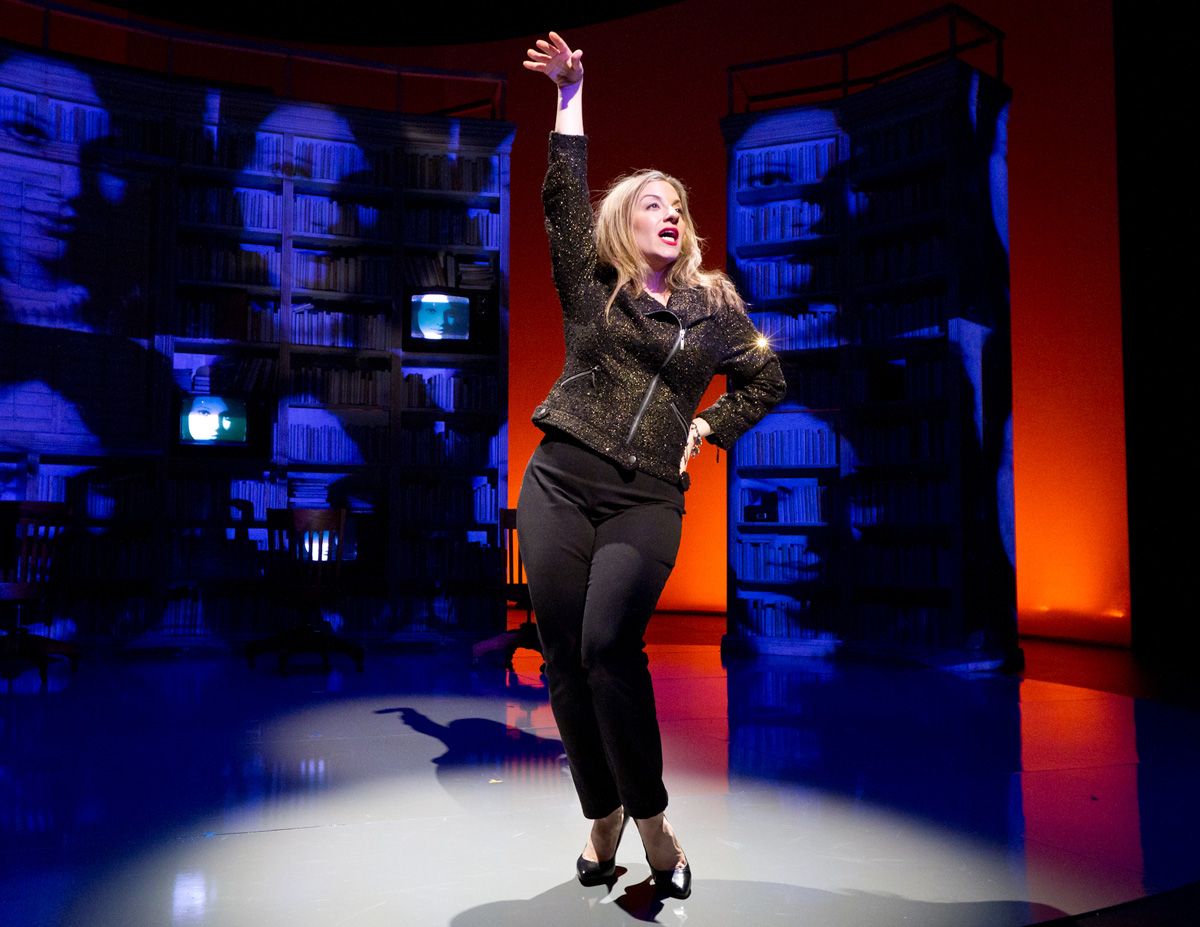
Stars of David. Script by Charles Busch, from the book by Abigail Pogrebin. Philadelphia Theatre Company, 2012
*
Growing up in a New York Jewish home, Abigail Pogrebin was confused about her heritage. She and her parents were ambivalent about religious customs, even hostile to some of them. This bright and inquisitive young woman tried to discover how other Jews had handled this problem and, being a writer of celebrity profiles, she naturally turned to famous Jews.
Most of them said they’d never been asked to discuss their Jewishness before, and found the project to be intriguing.
After her book of 62 conversations was published in 2005, many readers agreed. Now it’s been turned into a musical play.
Well-known figures like Ruth Bader Ginsburg, Joan Rivers and Gloria Steinem are impersonated on stage and their words are channeled into songs, some of them comic and some dramatic.
Most of those portrayed have abandoned customs, yet they all feel proud to be Jewish. They share with the author an uncertainty about what it means to live a Jewish life today. Reading the book, you see that most have endured anti-Jewish insults, but the show minimizes this. Leonard Nimoy’s song states it forcibly, and apparently a decision was made that repetitions of similar experiences would sound whiney.
Charles Busch’s script creates a fictional Jewish woman, loosely based on Ms Pogrebin, who struggles with her identity as she contacts celebrities, and he pruned the stories and created bridges between them. Part of his skill is revealed in the way he took two chapters of nine pages each devoted to Dustin Hoffman and Mike Nichols and consolidated them into a three-minute sketch about The Graduate that embodied the best parts of both men’s stories.
His funniest line was when a character looked at an uncircumcised penis and exclaimed: “If I wanted to see that much drapery I’d have bought tickets to Phantom.”
Producer Aaron Harnick asked 22 songwriters to read the book and select the subjects they’d like to set to music. The edited result is thirteen songs, some of them collaborations. It’s exciting to hear renowned songwriters applying their varied talents to a single topic. It was especially interesting to hear rock composers write ballads, and a lyricist like Sheldon Harnick supply music as well as words.
“Smart People,” by David Shire and Richard Maltby, quoted West Wing scriptwriter Aaron Sorkin as he extemporized euphemisms for Jewish folks. Tom Kitt (Next to Normal) and Abigail Pogrebin wrote music and words describing how Ruth Bader Ginsburg, a knowledgeable and observant teenager, was marginalized by the sexist rules of the religion when she was mourning the death of her mother.
Designer Kenneth Cole related a traumatic story that grew out of his decision to intermarry and allow his children to be raised as Christians. This was captured in a haunting song, “Through the Darkening Blue,” by Duncan Sheik and Steven Sater, collaborators on Spring Awakening, who revealed a different facet of their talent here.
Michael Friedman is known for his rock musical Bloody Bloody Andrew Jackson; here he translated the words of his friend, the playwright Tony Kushner, in “Horrible Seders” (or “Pharaoh Cannot Win”), a complex song that channels some of the spirit of Fiddler On the Roof.
Speaking of which, the co-creator of that show, Sheldon Harnick, wrote words and catchy music for a portrait of Norman Lear.
Jeanine Tesori (of Shrek and Caroline, or Change) collaborated beautifully with Susan Birkenhead (Jelly’s Last Jam) on the narrative of Gloria Steinem, who as a young woman was consigned to do the cooking as the men of her family ran the seders: “This Is Who I Am.”
William Finn (of Falsettos) and Will Aronson partnered on a clever song for Joan Rivers, “The Jews Take Care of Everything.” In a similar vein, Amanda Green (Bring It On) wrote words and music for the show-stopping comical anthem of Fran Drescher, “Just Be Who You Are,” in which she sang about how she created TV’s “The Nanny”: “I put the Jew in Julie Andrews.”
One of the best songs, and certainly the saddest, was “Broken Pieces,” about the lyric-writers Alan and Marilyn Bergman. They wrote their own words and Marvin Hamlisch, just before his death, wrote the lovely music. The melody and the narrative, about picking up and saving the pieces of the glasses that are smashed in joy at Jewish weddings, are equally memorable.
The cast was excellent in multiple roles: Nancy Balbirer, Alex Brightman, Joanna Glushak, Brad Oscar and Donna Vivino. Jeff Marder led the small band. Gordon Greenberg directed.
Read other reviews on The Cultural Critic